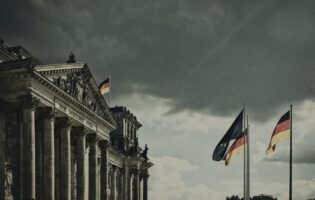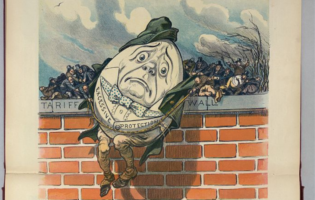It’s Not All About Refugees: Five Lessons from Germany’s Super Sunday

Rana Deep Islam
McKinsey & Company
Dr. Rana Deep Islam works as a Berlin-based Client Development Advisor for the Public Sector at McKinsey & Company. Prior to joining McKinsey & Company he had been a Senior Manager at EY and a campaign manager for the SPD’s chancellor candidate Martin Schulz during his campaign in the run-up to the German federal elections in 2017. Prior to that, he was in charge of the management of the European project portfolio at Stiftung Mercator and gained further professional experience at the Bertelsmann Foundation, the European Parliament, the School of Advanced International Studies (SAIS), and the Gesellschaft für Internationale Zusammenarbeit (GIZ). Rana holds an MA from the College of Europe in Bruges and a PhD from the University of Erlangen-Nurnberg. He was a DAAD/AGI Research Fellow in May and June 2011. Rana publishes frequently in academic journals and media on European affairs and long-term economic development.
Last Sunday, three German Bundesländer—Baden-Württemberg, Rhineland-Palatinate, and Saxony-Anhalt—held their state elections. The federal states themselves are very diverse. The first is one of Germany’s most industrialized powerhouses and governed by a coalition led by the Green Party under Winfried Kretschmann; the second is a very rural Bundesland with a Social Democratic minister-president, Malu Dreyer; and the third is one of the states of the former German Democratic Republic. Saxony-Anhalt itself is traditionally governed by the CDU, most recently under Reiner Haseloff. Together these “hyphen-states” represent roughly 20 percent of Germany’s overall population. Given the diversity among these three states—as well as their size—suggests that Sunday’s elections can offer a representative impression of the general political mood in Germany.
In addition, Sunday’s were the first relevant elections after the start of the so-called refugee crisis. For almost a year now, the seemingly endless influx of refugees to German territory has divided the political atmosphere in Germany into two camps: one that supports Chancellor Angela Merkel’s welcoming approach toward the refugees, and one that opposes it. The result is a political atmosphere in Germany that many describe as poisoned. Incidents like the New Year’s assaults on women in Cologne or the growing number of attacks on refugee housing have catalyzed the split in Germany’s public opinion on asylum politics. It came as no surprise that party campaigns and the political debate in the run-up to Sunday’s elections were dealt more with matters of federal and European refugee politics than with state-specific, regional topics. As such, Germany’s Super Sunday needs to be seen through the lens of this dominating policy issue. However, as will be explained later, the results go even further than opinions on refugee policies and touch upon the general condition of Germany’s parliamentary democracy. From this, we can learn five main lessons from the electoral results.
1: A Right-Wing Party Is Part of the German Parliamentary System
Sunday’s results mean that a right-wing populist party—the Alternative für Deutschland (AfD)—is now finally part of the German parliamentary system. The AfD reached double-digit results in all three states. In Saxony-Anhalt it even gained the second biggest share of votes with 24 percent, more than the combined votes of the Social Democrats (SPD), the Greens, and the Liberals (FDP). The AfD is now represented in eight out of sixteen German state parliaments. The party can no longer be considered an electoral accident or a temporary phenomenon like the former Pirate Party movement, which disappeared very quickly after its emergence. However, the AfD still must prove that it is capable of doing parliamentary work, with all the responsibilities and duties involved. For the time being the AfD has distinguished itself only as an anti-establishment party, with no interest in or no capacity to formulate sustainable and forward-looking solutions for political challenges. Rather, it is the protest against established political structures that keeps the AfD and its members together. As a consequence, executive and legislative processes will get more burdensome and intellectually less demanding wherever the AfD is represented in parliament.
2: Existing Coalitions Must Change
While it is difficult to identify a general political trend from those three elections, we do know that none of the current coalitions can be maintained. That does not mean total upheaval, however, as the minister-presidents and their parties currently governing will most likely stay in power: the Greens in Baden-Württemberg, the SPD in Rhineland-Palatinate, and the CDU in Saxony-Anhalt. Though all three parties display huge differences in their programs and their personnel, it can still be said that they all back Merkel’s refugee course one way or another. The Greens and the SPD are already among Merkel’s staunch supporters. Baden-Württemburg’s Kretschmann even declared that he prays for Merkel daily to stay on course with her effort to reach a European consensus on asylum politics. Only Saxony-Anhalt’s CDU tried to keep quiet on the refugee issue; it was only shortly before the vote that Haseloff cautiously criticized Merkel’s politics. Still, although the AfD is the undoubted winner of Germany’s Super Sunday, the fact remains that 80 to 90 percent of the electorate voted for parties and candidates who do not openly oppose Merkel or her grand coalition’s liberal stance on migration and asylum. The electoral results cannot be considered a display of no confidence in the chancellor.
3: Merkel Still Enjoys Support Among Germans
Despite the AfD’s gains, the results show that Angela Merkel remains undisputed as chancellor and as head of the ruling CDU. Certainly, she will face growing criticism, and especially in her own party. The rise of the AfD is a result of Angela Merkel’s policy of “social democratizing” the formerly Christian-conservative CDU. Many of the party’s fundamental, normative pillars were either removed or redefined under Merkel’s leadership, most recently during the refugee crisis. This development created space in the center-right spectrum that is now being filled by the AfD. However, Merkel still enjoys widespread support in her party because a) on a policy level, no one has an alternative concept at hand for how to tackle the refugee crisis differently and b) there is no contender in sight who might be able to seriously challenge Merkel and her power base. Indeed, Julia Klöckner, the CDU front-runner in Rhineland-Palatinate, desperately tried to distinguish herself from Merkel when she formulated her own ideas on border control and immigration policy. However, with her tremendous defeat last Sunday, Klöckner took herself out of any equation of a post-Merkel era. Klöckner will need to fight hard to remain of any relevance in party politics.
4: Forming Coalitions Just Got More Difficult
After Sunday, all three state parliaments now consist of five party fractions, making it all the more difficult to form parliamentary democratic majorities. Coalitions according to the usual ideological party camps, namely center-left with the Greens and the SPD and center-right with the CDU and the FDP, are no longer possible. In Baden-Württemberg and Saxony-Anhalt, even the so-called “grand coalition” between the SPD and the CDU is not able to reach the absolute majority threshold, which is a precondition for a stable government. New and so far unknown coalition scenarios are being discussed and named after the combination of the party colors, e.g., the Germany Coalition (CDU, SPD, FDP), the Jamaica Coalition (CDU, Greens, FDP), the Kenya Coalition (CDU, SPD, Greens), or the Traffic Light Coalition (SPD, Greens, FDP). In all cases, the fact remains: the more parties are in government, the more unstable the government is. In other words, a three-party coalition will always have bigger problems in finding political and ideological common ground than a two or one-party government. This trend will most likely be reflected in the federal elections next year, too, with a Bundestag consisting of presumably seven parties (CDU, CSU, SPD, the Greens, FDP, the Left, AfD). After decades of relative parliamentary stability, the Federal Republic is finally caught up in a European development, namely the fragmentation of the party spectrum.
5: The “Catch-All” Parties Are Eroding
After more than half of century of stability, we are now seeing the erosion of the Volksparteien, Germany’s two biggest “catch-all” parties, the CDU and the SPD. In Baden-Württemberg and Saxony-Anhalt, the SPD only reached 12 and 10 percent, respectively. In these and other Bundesländer, the party is far from achieving a governmental mandate and can play—at most—the role of a parliamentary majority provider in building coalitions. To a lesser extent, this is also true at the federal level. For years, polls show the SPD stuck at a margin between 20 and 25 percent. As a consequence, there is currently no prominent Social Democrat well-positioned or willing to run for chancellor given the unpromising chances. The two most talked-about options, Olaf Scholz, the mayor of Hamburg, and Andrea Nahles, Federal Minister for Social Affairs, are political heavyweights and seem to have the right qualities but, in order not to ruin their once-in-a-lifetime opportunity, are waiting out Merkel and looking at candidacy in 2021. However, it is seriously doubtful whether the SPD will be in better shape by then. Similar tendencies of decline are visible within the CDU as well. Baden-Württemberg has long been one of the CDU’s traditional powerhouses; now, it’s been overtaken by the Green Party, a political humiliation to many in the CDU. Furthermore, the party has serious problems in reaching out to urban electorates: a minority of major German cities are governed by the Christian Democrats. The decay of the CDU may not happen as quickly as in the case of the SPD; however, the trend is irreversible and, sooner or later, it will apply to both parties.
Looking Forward: Populist Sentiment Will Remain
Sunday’s state elections’ significance extends beyond the refugee crisis and has implications for federal politics in general. Overall, we are seeing Germany’s political center melt away while the political extremes grow. Indeed, German society is very much politicized at the moment. Optimists would argue that this situation might lead to a higher level of democratic participation, as the turnout of voters rose significantly in all three state elections, a stark contrast to the voter participation of the past twenty years. People seem to be eager to get involved in political debates. However, the reality remains: it was mainly the AfD and not the established parties that was able to mobilize former non-voters. It is therefore more than likely that the climate in Germany will further polarize between center-left and liberal forces on the one side and a growing number of national-conservatives and right-wing extremists on the other.
It would be too easy to explain this split by refugee politics only. The inflow of migrants and its related over-simplification into a pro- and an anti-Merkel camp is just a temporary cause. Some experts are forecasting a significant reduction of asylum-seekers at the gates of Europe in the near future, not because the wars fueling the refugee crisis will be pacified, but because the Balkans and some eastern European countries are building fences and walls to block the refugee routes. However, even if the influx of refugees on German soil diminishes, new topics will enter the agenda and they will heat up the division of Germany’s political landscape as described above. Finally, German decision-makers have just started to discuss how to best integrate refugees into German society, e.g., with regard to social housing, employability, or schooling. The main challenge has just begun. Given the cultural and religious background of those new migrants, Germany will inevitably become more diverse, and it is no surprise that the AfD is now apparently willing to put a strategic focus on anti-Islam politics, as the German news magazine “Der Spiegel” recently reported.[1] Seeing that more than 50 percent of the German people perceive Islam as a threat, it is very likely that the AfD will successfully establish itself as a permanent populist voice in German politics regardless of the duration and outcome of the refugee crisis.
As other European countries have already had to do, Germany needs to familiarize itself with the idea of having an openly right-wing party in the middle of its public discourse. Other countries can look back on a decade-long history of populist parties that later even became part of the mainstream, such as in France or Austria. While this might not be a desirable situation, it is a matter of fact. So how can Germany deal with those newly emerging forces on the political spectrum? There are some cases when it is appropriate to ignore them, and others when it seems to be better to actively involve them in a debate. There may also be cases when established parties are better off stigmatizing right-wing populists. This, however, requires tact and intuition, something that German decision-makers and especially opinion-makers need to learn now.
Dr. Rana Deep Islam is a Non-Resident Fellow at AGI.
[1] “Interne E-Mails: Islamkritik soll Schwerpunkt im neuen AfD-Programm werden,” Spiegel Online, 11 March 2016.









